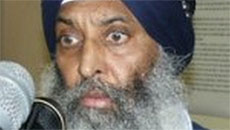While addressing a gathering by the Canadian Women for Women in Afghanistan’s Vancouver Chapter, award winning journalist Mellissa Fung spoke about her experiences when she was kidnapped while covering the Canadian military mission in Afghanistan and her recent visit to go see the same country again. The event 'An evening with Mellissa Fung' was held in Vancouver April 29th and alo featured a screening of Fung's documentary for CBS's The National.
Fung said thankfully her captors were not the Taliban, had they been she wouldn’t have survived.
"They threatened to sell me to the Taliban and that was my biggest fear," Fung told the audience.
Highlighting the situation in Afghanistan after the withdrawal of the Canadian troops she said that the people have begun to realize that they now need to stand on their own two feet now as the help that they had become used to will no more be there.
"Right now we don’t know what’s going to happen, maybe after the next President is elected we will have a better idea," she remarked.
She also highlighted the fact that Canada’s involvement in the country had brought about a tangible difference. She said that while the government might not have taken a direct stand but the people really helped and paid attention to the plight of the Afghan people.
She further indicated that Afghans have started to realize that the help they were relying on will not be there anymore.
"Talibans are not true Afghans. The Afghan people that I have met have nothing in common with the Taliban," said Fung.
Talking to media sources earlier in an interview she said, “I think about the women I've met in literacy classes—during the Taliban's time, they were not allowed to go to school, and as a result, they can't read, they can't even write their own names. And now they're learning how to do that. And once you teach somebody to read, they can't unlearn that.”
When answering questions about how she coped up with those brutal twenty eight days, she narrated a small incident about a little Afghan girl who clung to her when the Canadian troops were distributing Eid gifts to the neediest people in the Kandahar province. Thinking about this girl made Fung go through her ordeal at a time when she had begun to smoke twelve cigarettes each day.
"Through the interpreter I found out that she had lost her father, her mother couldn't work much and her brother had lost his leg because he stepped on a land mine... As bad as my situation was it wasn't half as bad as the situation of many people in Afghanistan," she said.
She did not indulge in too much detail about what happened to her rather she is now more interested in talking about the plight of women and girls in Afghanistan and to get international attention for their stories.
"I saw a therapist for a while. For the longest time I never liked to be at work with my bosses and admit that I had symptoms of post traumatic stress. Even though you feel good and you are okay, people look at you differently... the worst thing was not being able to tell that little girl's story but to tell my own story" she added.
Lauryn Oates, Project's Director for Canadian Women for Women in Afghanistan said that there is now a thriving women's movement in Afghanistan which is relying on the international community for support.
"There is definitely over a thousand organizations working for women's rights," she told. She also said that a large number of Afghans who were based abroad had gone back to Afghanistan after the fall of the Taliban government, in order to help and develop the country, so Afghanistan has experienced a kind of reverse brain drain in the past few years. However she emphasized that they need a sustained commitment from the international community.





